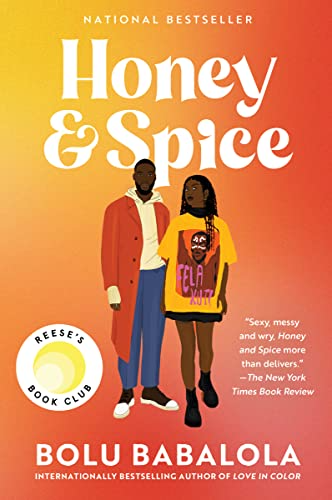
Staff Pick: Honey and Spice
I don’t remember what drew me to pick up this book. I’m a sucker for a good cover, so the illustration of a young Black couple probably caught my eye. However, it took reading just the first five pages to draw me into the story. The main character is Kiki Banjo, a smart, hilarious, sensitive (although we don’t find that out for a bit), and opinionated student at Whitewell University in London. She’s tough. She hosts a popular radio show that helps Black female students navigate the treacherous waters of dealing with the Black male students on campus.

This is where she publicly calls out the “Wasteman of Whitewell,” a fellow student named Malakai Koredei. Why is he a Wasteman? He dates lots of girls, but that’s it. He’s not doing relationships. Period. Enter the kiss. Kiki is trying to get an admirer off her back because she just doesn’t like him. They hooked up a few times, although this only involved some heavy making out and touching. But he wanted more. She didn’t. So Malakai was in the right place at the right time. They’re attending a Blackwellian party, which, as the name suggests, is a gathering of Black students at Whitewell University. And that’s when the kiss happens. There are sparks, and both Kiki and Malakai feel… something. But what, exactly?
And how does it work after Kiki called Malakai a Wasteman and Malakai doesn’t do relationships but now they’ve just had a very public, very steamy make-out session? They decide to have a “fake” relationship to stop tongues from wagging. I forgot to mention Kiki’s mentor also suggested Malakai and she work together on their respective passions so that Kiki can win a scholarship and Malakai can explore his filmmaking expertise. That working relationship adds another layer of complication that the author deftly explores.
I don’t want to give away the entire plot, but what makes this book shine is how the relationship between Kiki and Malakai develops. It’s complicated because both of them are coming into it with their own past traumas, something that is relatable to everyone. We get to see Kiki and Malakai open up to each other, close down, back away, and come together in a unique way that made me root for both of them to find happiness, whatever form happiness may take for each of them. The book starts out as deceptively simple. It’s anything but. The story depicts young love through old souls. It shows the importance of friendship in a romantic relationship and shows us what that could look like. Most importantly, it reminds us that addressing trauma is the only way we heal and grow. Without doing that work, we can’t successfully move forward in any part of our lives.
Felicia Fulks is the Asa F. Seay Business Librarian.